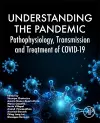
Understanding the Pandemic
8 contributors - Paperback
£126.00
Giuseppe Orlando, MD, PhD, Marie Curie Fellow, is an Associate Professor and a kidney and pancreas transplant surgeon scientist at the Wake Forest University School of Medicine, in Winston Salem, USA. His research aims at developing platforms for the bioengineering and regeneration of transplantable organs, and at developing therapies to enhance the innate ability of the human body to repair itself after damage. His literature output aims at bridging organ transplantation to regenerative medicine. Professor of Nephrology, Director of the Department of Medicine of the Ospedali Riuniti di Bergamo (Papa Giovanni XXIII Hospital), Italy and Director of the Division of Nephrology and Dialysis of the same hospital. He also directs the Negri Bergamo Laboratories of the “Mario Negri Institute for Pharmacological Research, a group of basic scientists and clinicians devoted to the study of human renal diseases and their corresponding animal models from the perspective of pathophysiology and therapeutic intervention. He touched major advances in many areas of nephrology. For example, his studies have led to new insights into many disorders, including the interactions between platelets and endothelium, pathophysiology of glomerular diseases and the factors that influence the progressive loss of kidney function. Work focused on improving the outlook for patients with end stage renal disease. Giuseppe Remuzzi pays tribute to the work of pioneers such as Barry Brenner, who delved deep into the processes behind glomerular function and their possible reversibility. Early work on the use of angiotensin-converting enzyme inhibitors to slow the decline of glomerular filtration rates proved dialysis was avoidable, not inevitable. Studies on immunologic mechanisms that influence the survival of transplanted organs, understanding of immunologic tolerance in the disorders that are linked to autoimmunity and finally, genetic diseases of the kidney have also been areas of investigation. Concerned by kidney donation shortages and deploring the current practice of discarding suboptimal donor kidneys, his team has shown that transplanting such kidneys in pairs is feasible and have set up an international effort to validate this approach. Giuseppe Remuzzi is investigating the kidney's ability to regenerate itself. He authored and co-authored more than 1201 scientific articles, reviews and monographs and serves on editorial boards of numerous journals, he is member of the International Advisory Board of The Lancet and is Editorial Board member of the New England Journal of Medicine from 1995-2013. During his professional career he received the International Society of Nephrology (ISN) Jean Hamburger Award (World Congress of Nephrology (WCN) 2005, Singapore), the John P. Peters Award (American Society of Nephrology (ASN) 2007, San Francisco) and the ISN AMGEN Award (WCN 2011, Vancouver). In November 2011, he won the Third Edition of the International Award "Luis Hernando" assigned by the Iñigo Alvarez de Toledo Renal Foundation (FRIAT) in Madrid, Spain. He is, since June 2013, President of the International Society of Nephrology (ISN) for the period 2013-2015. Professor Williams has had 48 years experience in biomaterials, medical device and tissue engineering, working mostly at the University of Liverpool, UK where he was ultimately Professor of Biomaterials and Biomedical Engineering, Director of the UK Centre for Tissue Engineering and Senior Pro-Vice Chancellor of the University. During his career he has published over 30 books and 400 papers: his latest book, Essential Biomaterials Science, was published by Cambridge University Press in June 2014. He was Editor-in-Chief of Biomaterials, the world’s leading journal in this field between 2000 and 2014. He has received the major awards from the US, European and Indian societies of biomaterials including the Founders Award of the US Society for Biomaterials in 2007, and received the prestigious Acta Biomaterialia Gold Medal in 2012. In 1999 he was elected as a Fellow of the Royal Academy of Engineering and is a Foreign Fellow of the Indian National Academy of Engineering and a Fellow of the American Institute of Medical and Biological Engineering, all in recognition of his contributions to engineering in medicine. He was global President of the Tissue Engineering & Regenerative Medicine International Society from 2013-2015. He was a scientific advisor to several divisions of the European Commission during the 1990s and wrote several opinions on which European actions were taken. He has, over the last 20 years, given evidence in several major product liability and patent legal cases in the USA, Europe and Australia. Professor Williams left the University of Liverpool in 2007. While retaining the title of Emeritus Professor at Liverpool, he is currently Professor and Director of International Affairs, Wake Forest Institute of Regenerative Medicine, North Carolina, USA. In addition, he is a Visiting Professor in the Christiaan Barnard Department of Cardiothoracic Surgery, Cape Town, South Africa, a Adjunct Professor at the University of Technology, Sydney, Australia, and a Guest Professor, at Tsinghua University, Beijing, and Advisory Professor at Shanghai Jiao Tong University, China. He is Visiting Chair Professor of Biomedical Materials, Taipei Medical University, Taiwan. In Cape Town, along with Professor Peter Zilla, the current Chris Barnard Professor of Surgery, he has formed a company that will produce low cost but high technology medical devices that can be used with minimally invasive procedures to treat young adults in sub-Sarah Africa, who are suffering from rheumatic heart disease but currently have no therapies available to them.